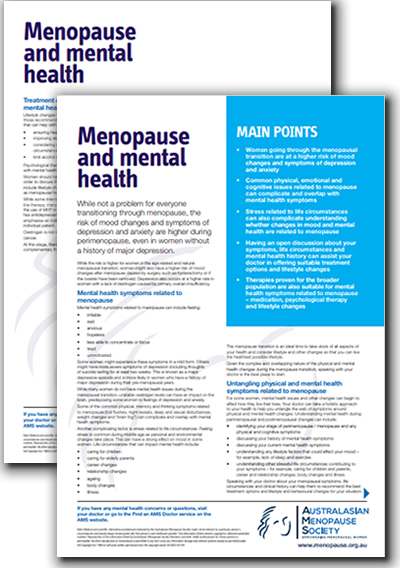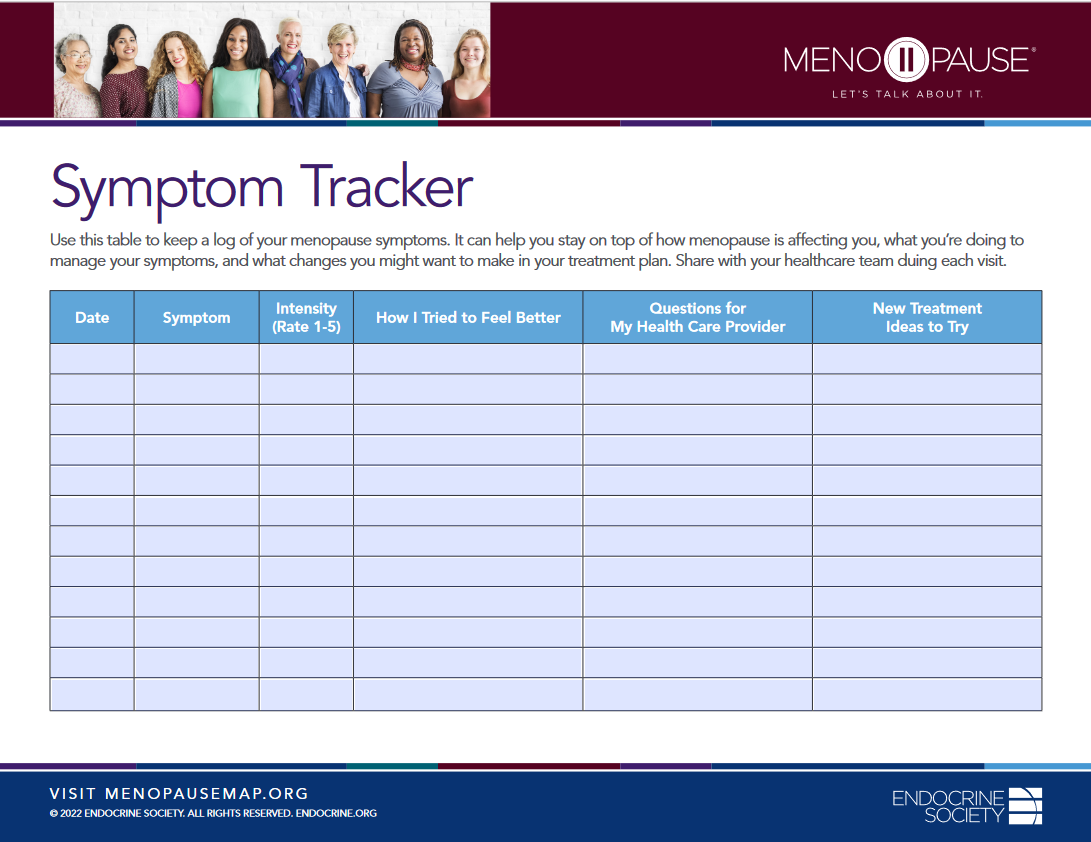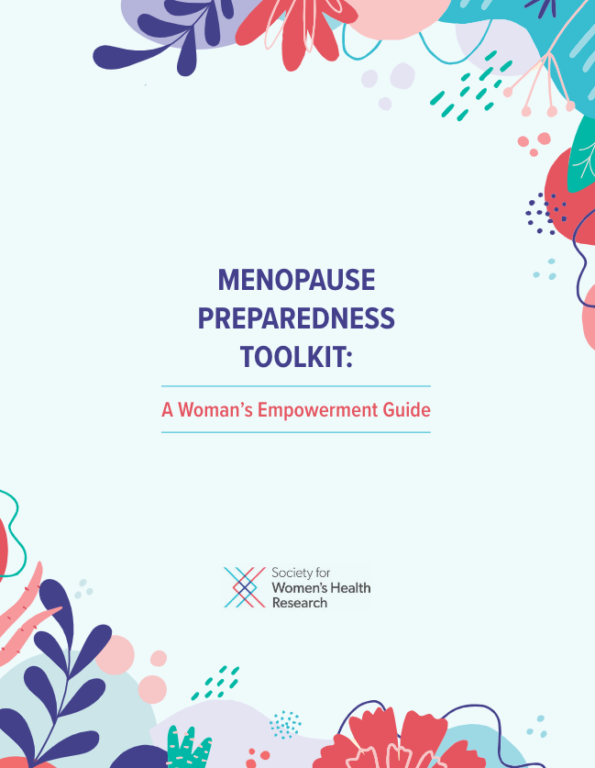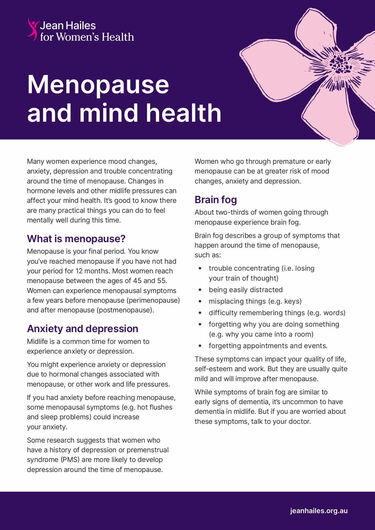“It’s important to realise that the mental symptoms
of menopause are as real as the physical ones, and
you should not wait to seek help if you are struggling”.1
Umbrella
What may the Menopause Psychological Symptoms Umbrella include?
Depending on the Source (DotS) this Umbrella may include:
- Menopausal/Menopause Emotional/Mental Health/Psychological Changes/Symptoms
- Menopause-Related Emotional/Mental Health/Psychological Changes/Symptoms
- Perimenopausal/Perimenopause Emotional/Mental Health/Psychological Changes/Symptoms
Psychological Symptoms
What are some menopause psychological symptoms?
In Menopause and Mental Health: Mental Health Symptoms Related To Menopause, content updated February 2023, the Australasian Menopause Society elaborate on:
 “Mental health symptoms related to menopause can include feeling:
“Mental health symptoms related to menopause can include feeling:
- Irritable
- Sad
- Anxious
- Hopeless
- Less able to concentrate or focus
- Tired
- Unmotivated”.2
In Symptoms of Menopause: Physical and Emotional Symptoms – Psychological and Emotional Symptoms the (Australian) Jean Hailes for Women’s Health (JH) elaborate on:

“Psychological and emotional symptoms may include:
- Feeling irritable or frustrated
- Feeling anxious
- Difficulty concentrating
- Forgetfulness
- Lowered mood
- Mood swings
- Feeling you can’t cope as well as you used to”.3
In Menopause and Your Mental Wellbeing the (Scottish) NHS Inform explain:
- Anger and irritability
- Anxiety
- Forgetfulness
- Loss of self-esteem
- Loss of confidence
- Low mood and feelings of sadness or depression
- Poor concentration – often described as ‘brain fog’ and/or lost words”.4
History of Depression
Is there an association between a history of depression and menopause?
On page 777 in The 2022 Hormone Therapy Statement of The North American Menopause Society: Depression, published July 2022 and “endorsed by more than 20 well-respected international organizations”, the North American Menopause Society (NAMS) explain:
Self-Management
What are some self-management techniques for menopause psychological symptoms?
On page two in Mental & Emotional Health: What Can You Do To Help Your Mental & Emotional Health the JH elaborate on what you can do to manage your mental and emotional health.
Antidepressants
Are antidepressants used to treat mental-health related symptoms during the menopause?
In Menopause and Your Mental Wellbeing the NHS Inform elaborate on:
Menopausal Hormone Therapy
Is menopausal hormone therapy (MHT) used to treat menopause psychological symptoms?
In Mood and the Menopause: Management – Menopausal Hormone Therapy (MHT), content updated 09 February 2023, the Australasian Menopause Society explain:
What is RCTs?
RCTs can be an abbreviation for Randomized Controlled Trials.
Health Care Provider
What if I would like help with menopause psychological symptoms?
If you would like help with menopause psychological symptoms it, may be in your best interest to choose to talk to your health care provider about this
In Menopause and Your Mental Wellbeing the NHS Inform also encourage us to seek help:
Who is a GP?
DotS and/or DotC (Depending on the Country) a GP may be a qualified and registered general practitioner, a medical practitioner, a medical doctor or a doctor.
Health Topics A-Z
Where may I find Health Topics A-Z related to Menopause Psychological Symptoms?
In Health Topics A-Z you may find:
Links
Where may I find Links related to Menopause Psychological Symptoms?
Your Country may have Links similar to:
Links
This Links List to third party websites is neither comprehensive nor exhaustive. Inclusion on this Links List does not imply endorsement or recommendation. Non-inclusion on this Links List does not imply non-endorsement or non-recommendation. Third party websites are not under the control of Meno Martha International Menopause Directory. Third party websites may contain explicit medical images and/or sexual references. Please read Meno Martha International Menopause Directory’s Links Policy before proceeding to a Link. Please contact Webmaster if you experience a problem with a Link.New or Updated
- Does Menopause Really Cause Depression? [06 June 2024]
- How To Manage Menopausal Insomnia [04 July 2024]
- Is Hormone Therapy A Key Strategy In Treating Menopausal Depression? [Video] [17 May 2024]
- ‘Menopause Depression Nearly Killed Me’: Lynsey’s Life-Changing HRT Journey | This Morning [16 June 2024]
- “Not feeling like myself” in perimenopause — what does it mean? Observations From the Women Living Better Survey [May 2024]
- Surprising Menopause Symptoms Revisited | Dr Louise Newson [25 June 2024]
- 7 Ways To Boost Your Health By Practicing Gratitude
- Anxiety
- Anxiety Self-Help Guide
- Anxiety vs. Depression: Which Do I Have (or Is It Both)?
- Askearlymenopause.org [Ask EM] [+ Video: What Is Early Menopause?]
- BMS TV: Menopause Explained
- Bioidentical Hormones: Are They Safer?
- CAMS Menopause Hour With the German and Swiss Menopause Society [Council Of Affiliated Menopause Societies] – Perimenopause: A Clinical Challenge
- Cognitive Behaviour Therapy (CBT) for Menopausal Symptoms
- Depression and the Menopause
- Does Menopause Really Cause Depression?
- Dr Louise Newson Breaks Down The Menopause & Lisa Snowdon Shares Her Experience | This Morning
- Emotional Wellness In Menopause
- Feeling Lonely
- Find A Menopause Practitioner [United States and Other]
- Find An AMS Doctor [Australasian Menopause Society i.e. Australia and New Zealand]
- Find Your Nearest BMS Menopause Specialist [British Menopause Society]
- How Do I Know If I Have A Mental Health Problem? [Video]
- How Mindfulness Meditation Improves Mental Health
- How To Manage Menopausal Insomnia [Video]
- How To Talk To Your Doctor About Midlife Brain Fog
- Is Hormone Therapy A Key Strategy In Treating Menopausal Depression? [Video]
- Jayashri Kulkarni: Our Hormones and Our Minds [Podcast]
- Joint Position Statement By the British Menopause Society, Royal College of Obstetricians and Gynaecologists and Society for Endocrinology on Best Practice Recommendations for the Care of Women Experiencing the Menopause
- Later Years (Around 50 Years and Over): Menopause and Post Menopause Health – Menopause [+ Video: Menopause Myths] [Other Languages and Formats]
- Later Years (Around 50 Years and Over): Menopause and Post Menopause Health – Menopause and Your Mental Wellbeing [+ Video: Menopause Only Affects You Physically!] [Other Languages and Formats]
- Later Years (Around 50 Years and Over): Menopause and Post Menopause Health – Signs and Symptoms of Menopause [+ Video: Talking Menopause With Your GP] [Other Languages and Formats]
- Later Years (Around 50 Years and Over): Menopause and Post Menopause Health – Supporting Someone Through the Menopause [+ Video: Men Don’t Need To Know About Menopause] [Other Languages and Formats]
- Let’s Talk About Perimenopause
- Looking After Yourself: Emotional Wellbeing
- Managing Anxiety
- Managing Your Symptoms: Managing Mood and Emotional Health
- Mastering Midlife Mood Changes With Marlene Freeman, MD
- Mayo Clinic Minute: How Lifestyle Changes May Help Manage Menopause Symptoms [+ Video]
- Menopause
- Menopause
- Menopause
- Menopause Depression
- Menopause Depression: Under Recognised and Poorly Treated [18 May 2024]
- Menopause Depression: Under Recognized and Poorly Treated [13 June 2024]
- Menopause Transition Does Not Increase Risk for Depressive Symptoms for All Women
- Menopause Map: Downloadable Resources – My Personal Path Print Tools: Questions for Your Health Care Provider

- Menopause Map: Downloadable Resources – My Personal Path Print Tools: Symptom Tracker

- Menopause Mindfulness: Embracing the Change of My Midlife
- Menopause Patient Information: 2. Talking To Your GP About Menopause
- Menopause Preparedness Toolkit Video Series: Lifestyle Tips for Menopause
 Menopause Preparedness Toolkit: A Woman’s Empowerment Guide
Menopause Preparedness Toolkit: A Woman’s Empowerment Guide- Menopause Symptoms: Mayo Clinic Expert Outlines Hormone and Nonhormonal Therapies
- Menopause Transition Does Not Increase Risk for Depressive Symptoms for All Women
- Menopause Treatments: What Works, What Doesn’t
- Menopause What Are the Symptoms?
- Menopause and Mental Health
- Menopause and Mental Health
- Menopause and Mind Health
- Menopause and Natural Therapies
- Menopause and Your Mental Wellbeing
- Menopause, Perimenopause, Hormone Therapy and Other Treatments With Madelyn Butler, MD [Podcast]
- Menopause: Ensuring A Tranquil Transition
- Menopause: Things You Can Do
- Menopause: Understanding the Changes and Finding Relief | Dr Susan Davis | The Proof Podcast EP 256
- MentalHealth.gov [Department of Health and Human Services, United States]
 Mentalhealth.org.uk [Mental Health Foundation, United States]
Mentalhealth.org.uk [Mental Health Foundation, United States]- Mood and the Menopause
- Mymenoplan.org [My Menoplan, United States]
- National Center for Complementary and Integrative Health: Herbs At A Glance
- National Center for Complementary and Integrative Health: How Safe Is This Product or Practice?
- National Center for Complementary and Integrative Health: St. John’s Wort
- National Institute of Mental Health [United States]
- Navigating Menopause: Expert Insights and Solutions | Dr Susan Davis | The Proof Podcast EP 245
- “Not feeling like myself” in Perimenopause — What Does It Mean? Observations From the Women Living Better Survey
- Our Best Mental Health Tips – Backed By Research
- Perimenopause
- Perimenopause
- Perimenopause Anxiety and How to Treat It
- Perimenopause and Menopause Checklist: Translated Checklists
- Perimenopause and Menopause Symptom Checklist

- Probiotics May Help Boost Mood and Cognitive Function
- Promoting Good Mental Health Over the Menopause Transition
- Self-Help Tool: Menopause and Mental Wellbeing
- Should You Try An L-Tyrosine Supplement? A Look at Its Benefits and Side Effects
- Supporting A Loved One Through Menopause
- Surprising Menopause Symptoms Revisited | Dr Louise Newson
- Symptoms of Menopause: Mood and Emotional Health
- The Lancet: Series From the Lancet Journal – Menopause 2024
- The Risk of Depression In the Menopausal Stages: A Systematic Review and Meta-Analysis
- The Truth About Menopause Supplements | Dr Sarah Berry
- Therapy Could Be Effective Treatment for Non-Physical Symptoms of Menopause
- Tips To Help Manage Menopause Symptoms
- Top Tips To Improve Your Mental Wellbeing
- Treating Menopause Symptoms: Medications, Lifestyle & Self-Care
- Using Natural Therapies In the Menopause Transition – Webinar
- Video Series-2023: NAMS 2023 Nonhormone Therapies Position Statement for Bothersome Menopause Symptoms
- Video Series-2024: Preparing for Your Menopause Health Care Visit
- Videos and Podcasts: Videos – Interviews: A Simple Approach To Menopause: The Menopause Quick Six (www.MQ6.ca)
- Videos and Podcasts: Videos – Interviews: The Menopause Blues
- Videos and Podcasts: Videos – Interviews: What Women Should Know About Menopause and Brain Fog
- What Everyone Should Know About Menopause Symptoms
- What Is Cognitive Behavioral Therapy?
- What’s the Link Between the Menopause and Anxiety?
- Why Didn’t Anyone Tell Me This? Episode 3: Dr Annice Mukherjee: Your Essential Menopause Toolkit
Sources
Where may I find the Sources quoted?
You may find the Sources quoted at:
Sources
- Menopause and Your Mental Wellbeing. Last Updated: 29 November 2022. NHS Inform https://www.nhsinform.scot/healthy-living/womens-health/later-years-around-50-years-and-over/menopause-and-post-menopause-health/menopause-and-your-mental-wellbeing/ Accessed: 02 July 2024
- Menopause and Mental Health: Mental Health Symptoms Related To Menopause. Content Updated February 2023. Australasian Menopause Society https://www.menopause.org.au/health-info/fact-sheets/menopause-and-mental-health Accessed: 02 July 2024
- Symptoms of Menopause: Physical and Emotional Symptoms – Psychological and Emotional Symptoms. Last Updated: 21 April 2024 | Last Reviewed: 19 August 2022. Jean Hailes for Women’s Health https://jeanhailes.org.au/health-a-z/menopause/menopause-symptoms/ Accessed: 02 July 2024
- Menopause and Your Mental Wellbeing. Last Updated: 29 November 2022. NHS Inform https://www.nhsinform.scot/healthy-living/womens-health/later-years-around-50-years-and-over/menopause-and-post-menopause-health/menopause-and-your-mental-wellbeing/ Accessed: 02 July 2024
- The 2022 Hormone Therapy Position Statement of The North American Menopause Society: Depression. July 2022:77. The North American Menopause Society https://journals.lww.com/menopausejournal/Abstract/2022/07000/The_2022_hormone_therapy_position_statement_of_The.4.aspx Accessed: 02 July 2024
- Menopause and Your Mental Wellbeing. Last Updated: 29 November 2022. NHS Inform https://www.nhsinform.scot/healthy-living/womens-health/later-years-around-50-years-and-over/menopause-and-post-menopause-health/menopause-and-your-mental-wellbeing/ Accessed: 02 July 2024
- Mood and the Menopause: Management – Menopausal Hormone Therapy (MHT). Content Updated 09 February 2023. Australasian Menopause Society https://www.menopause.org.au/hp/information-sheets/mood-and-the-menopause Accessed: 02 July 2024
- Menopause and Your Mental Wellbeing. Last Updated: 29 November 2022. NHS Inform https://www.nhsinform.scot/healthy-living/womens-health/later-years-around-50-years-and-over/menopause-and-post-menopause-health/menopause-and-your-mental-wellbeing/ Accessed: 02 July 2024



